IAIN A DHÀ IAIN #2
Assynt is one of those areas which seems somehow
to have escaped the academic eye. When it comes to the far north of Scotland, you
can start in the south of Rosshire and work your way up, finding most dialects
covered by a monograph or a dictionary or a collection of some kind. Only
Assynt and Caithness –ironically the two areas which initially interested me
because of my family connections- have been left unexamined. I am currently
going through the Gaelic Linguictic Survey entries for south Caithness with a
fine-toothed comb and finding some very interesting features, especially in
comparison with neighbouring dialects. Houston,
we have an isolate! Other than that, Caithness will prove a difficult
one given the lack of supplementary poetry, song or vocabulary, despite the
bonus of 126 specifically dialect entries in Dwelly!
to have escaped the academic eye. When it comes to the far north of Scotland, you
can start in the south of Rosshire and work your way up, finding most dialects
covered by a monograph or a dictionary or a collection of some kind. Only
Assynt and Caithness –ironically the two areas which initially interested me
because of my family connections- have been left unexamined. I am currently
going through the Gaelic Linguictic Survey entries for south Caithness with a
fine-toothed comb and finding some very interesting features, especially in
comparison with neighbouring dialects. Houston,
we have an isolate! Other than that, Caithness will prove a difficult
one given the lack of supplementary poetry, song or vocabulary, despite the
bonus of 126 specifically dialect entries in Dwelly!
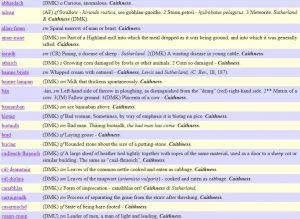 |
| Dualchainnt Ghollaibh an Dwelly |
A great bonus for areas not covered by
monographs is the Survey of Irish Dialects’ entries for the Scottish section.
From Loch Carrann (Lochcarron) up,
the northern dialects are covered by the SID, Ternes’ volume on a’ Chomraich (Applecross), Wentworth’s
astounding work in Geàrrloch (Gairloch),
the terrific little book on a’ Chòigeach
(Coigeach) dialect by Domhall Uilleam
Stiùbhart (Donald William Stewart) and co, the SID again in Assynt and Seumas
Grannd’s coverage of MacKay Country with his delightful dictionary. On the east
coast, we have Watson’s fascinating study of Easter Ross Gaelic and the rightly
world-famous investigation into East Sutherland Gaelic by my friend of some 6
years now, Nancy Dorian. There’s a lot of great material to work from for
potential revival purposes. But from the perspective of the revivalist, will
that be enough? If not, what’s missing?
monographs is the Survey of Irish Dialects’ entries for the Scottish section.
From Loch Carrann (Lochcarron) up,
the northern dialects are covered by the SID, Ternes’ volume on a’ Chomraich (Applecross), Wentworth’s
astounding work in Geàrrloch (Gairloch),
the terrific little book on a’ Chòigeach
(Coigeach) dialect by Domhall Uilleam
Stiùbhart (Donald William Stewart) and co, the SID again in Assynt and Seumas
Grannd’s coverage of MacKay Country with his delightful dictionary. On the east
coast, we have Watson’s fascinating study of Easter Ross Gaelic and the rightly
world-famous investigation into East Sutherland Gaelic by my friend of some 6
years now, Nancy Dorian. There’s a lot of great material to work from for
potential revival purposes. But from the perspective of the revivalist, will
that be enough? If not, what’s missing?
Kenneth Jackson’s insistence on local parentage
for all informants involved in the Gaelic Linguistic Survey was a stroke of utter
genius. It means that we have as complete and as reliable a picture as can
possibly be imagined -in a Highlands now so dreadfully deprived of dialect
speakers- of how native Gaels sounded.
In terms of what they said, Jackson’s
attitude to word geography left a lot to be desired. The subject appears to have
been almost looked down upon because of the unpredictability of the results but
for me this simply betrays the cloistered lifestyle of the über-academic. The
fact of the matter is that for the person on the street, it is words and their
variety that capture the imagination, rarely whether someone said /a/ or /ɛ/ or /əɣ/ or /əv/. I mean it’s great to possess
this information and we should be mighty glad to have it as part of the picture but over and above
that, no-one in their right mind gives a flying phoneme. My experience is that it is only people who have
been shut away from the real world their entire lives in universities who believe these concerns to be remotely important. So while phonologists and
phonemecists were fighting their fiddly little esoteric battles in the
corridors of imagined power, we were losing dozens upon dozens upon dozens of
precious words for things,
which will never be regained. A-CHAOIDH.
Bheil sibh ga mo thuigsinn? (Are you
understanding me?) A-CHAOIDH! (EVER!).
for all informants involved in the Gaelic Linguistic Survey was a stroke of utter
genius. It means that we have as complete and as reliable a picture as can
possibly be imagined -in a Highlands now so dreadfully deprived of dialect
speakers- of how native Gaels sounded.
In terms of what they said, Jackson’s
attitude to word geography left a lot to be desired. The subject appears to have
been almost looked down upon because of the unpredictability of the results but
for me this simply betrays the cloistered lifestyle of the über-academic. The
fact of the matter is that for the person on the street, it is words and their
variety that capture the imagination, rarely whether someone said /a/ or /ɛ/ or /əɣ/ or /əv/. I mean it’s great to possess
this information and we should be mighty glad to have it as part of the picture but over and above
that, no-one in their right mind gives a flying phoneme. My experience is that it is only people who have
been shut away from the real world their entire lives in universities who believe these concerns to be remotely important. So while phonologists and
phonemecists were fighting their fiddly little esoteric battles in the
corridors of imagined power, we were losing dozens upon dozens upon dozens of
precious words for things,
which will never be regained. A-CHAOIDH.
Bheil sibh ga mo thuigsinn? (Are you
understanding me?) A-CHAOIDH! (EVER!).
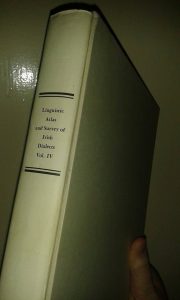 |
|
| SID Volume IV |
I must admit, I adore listening
to scholars discuss the finer points of lingistics; I could pass hours at it.
In fact I have several friends -they
know who they are!- whose knowledge astounds me and to whom I regularly go for
all manner of advice, but c’ mon down to brass tacks with me folks, Scotland
has been putting the cart squarely before the horse for the last 50 years at least. Since
the rumblings of the revival began, we have bent over backwards to keep up with
the Whittingtons, establishing a university, drafting all sorts of rules and
regulations, insisting that railway station signs in the middle of Lothian are
in Gaelic, putting quantity squarely before quality in terms of speakership,
and leaving old people who didn’t come from Skye or the Western Isles, whose
dialect didn’t “fit”,
to quietly pop their clogs in ignominy while the hallowed, well-funded halls
of esoteria buzz with essential activity. All of the above-mentioned things had their place, some of them a very large and important place in fact, but I can’t help thinking that while the bone was being polished to a sheen worthy of the British establishment, the marrow was yet being sucked out from within.
to scholars discuss the finer points of lingistics; I could pass hours at it.
In fact I have several friends -they
know who they are!- whose knowledge astounds me and to whom I regularly go for
all manner of advice, but c’ mon down to brass tacks with me folks, Scotland
has been putting the cart squarely before the horse for the last 50 years at least. Since
the rumblings of the revival began, we have bent over backwards to keep up with
the Whittingtons, establishing a university, drafting all sorts of rules and
regulations, insisting that railway station signs in the middle of Lothian are
in Gaelic, putting quantity squarely before quality in terms of speakership,
and leaving old people who didn’t come from Skye or the Western Isles, whose
dialect didn’t “fit”,
to quietly pop their clogs in ignominy while the hallowed, well-funded halls
of esoteria buzz with essential activity. All of the above-mentioned things had their place, some of them a very large and important place in fact, but I can’t help thinking that while the bone was being polished to a sheen worthy of the British establishment, the marrow was yet being sucked out from within.
I’m getting to my point in these
blogs by the way, don’t worry… I do have a solution, and it ain’t got sh*t to do with
suits, side-partings and seminars. It’s irreverent, old-fashioned and very cheap. Read on.
blogs by the way, don’t worry… I do have a solution, and it ain’t got sh*t to do with
suits, side-partings and seminars. It’s irreverent, old-fashioned and very cheap. Read on.
–
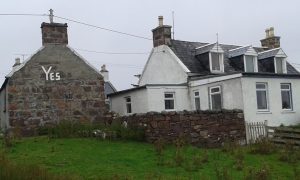 |
| STILL YES: taigh ann an Asaint |
Having scribbled away into my
notebook for a good 15 minutes, I looked up at the sky. It was dimming down and
if I didn’t want to be hitting Dornie in the dark and missing my dinner, I’d
need to get moving. I scoured my brain for anything else that was said, pulling
bits I’d forgotten from the beginning of the conversation with Iain back to
mind and writing them down at the end. Iain had long since closed the door and got back to enjoying his Sunday rest as I turned the car around and set
off.
notebook for a good 15 minutes, I looked up at the sky. It was dimming down and
if I didn’t want to be hitting Dornie in the dark and missing my dinner, I’d
need to get moving. I scoured my brain for anything else that was said, pulling
bits I’d forgotten from the beginning of the conversation with Iain back to
mind and writing them down at the end. Iain had long since closed the door and got back to enjoying his Sunday rest as I turned the car around and set
off.
His directions took me over a different road or two and I drove for
what seemed like longer than it should have been before hitting a gentle brae between
the moors with their scattered houses which scooped itself back out of a hollow
to arrive at the house of Iain
MacIllEathain (Iain MacLean). It was a neat-looking grey number, clearly
kept in decent condition by its owner, with a nice garden round about, but
nothing too fancy. The sea was visible from the road and the air was cool and
laced with moisture. I went through the gate, imagining what Iain looked like, mindful as always of disturbing anyone unnanounced in
these days of obsessive organisation.
what seemed like longer than it should have been before hitting a gentle brae between
the moors with their scattered houses which scooped itself back out of a hollow
to arrive at the house of Iain
MacIllEathain (Iain MacLean). It was a neat-looking grey number, clearly
kept in decent condition by its owner, with a nice garden round about, but
nothing too fancy. The sea was visible from the road and the air was cool and
laced with moisture. I went through the gate, imagining what Iain looked like, mindful as always of disturbing anyone unnanounced in
these days of obsessive organisation.
 |
| Robh Iain aig an taigh? |
I grew up with people coming in
and out of the house completely unannounced. You wouldn’t know someone was
visiting our place at Rubh’ Bàn
(pale point), just north of Taigh na
Bruaich (House of the Bank) until they were already upon you, in the door and
practically with their arse in the seat waiting for their coffee before you had
any idea they’d arrived. Nowadays,
if you haven’t Booked someone in the Face, or Grammed them Instantly, or
Snapped their Chat, you’re being exceedingly rude. Turn up without texting
ahead? How very dare you!
and out of the house completely unannounced. You wouldn’t know someone was
visiting our place at Rubh’ Bàn
(pale point), just north of Taigh na
Bruaich (House of the Bank) until they were already upon you, in the door and
practically with their arse in the seat waiting for their coffee before you had
any idea they’d arrived. Nowadays,
if you haven’t Booked someone in the Face, or Grammed them Instantly, or
Snapped their Chat, you’re being exceedingly rude. Turn up without texting
ahead? How very dare you!
I’m very rarely apprehensive
in the Highlands, but this was Sunday, and Assynt was rather a religious neck
of the woods not that long ago. I entered the porch, the front door being open,
and saw a nimble grey-haired man in his 70s scampering up the stairs of the
house. I chapped the glass panel in front of me before he could escape and he
peered quizzically through the balustrade, trying to work out if he recognised
me.
in the Highlands, but this was Sunday, and Assynt was rather a religious neck
of the woods not that long ago. I entered the porch, the front door being open,
and saw a nimble grey-haired man in his 70s scampering up the stairs of the
house. I chapped the glass panel in front of me before he could escape and he
peered quizzically through the balustrade, trying to work out if he recognised
me.
I stepped back from the porch,
not wanting us to have to vye for space within it should he see fit to emerge.
And so it was I met with Iain a Dhà (Iain
#2).
not wanting us to have to vye for space within it should he see fit to emerge.
And so it was I met with Iain a Dhà (Iain
#2).
Iain? He padded back down the stairs and loomed up to the glass
with a pleasant if confused expression. Nach
gabh sibh mo leisgeal (Won’t you accept my excuse ie excuse me). Thuirt Iain the Gate rium gum bu chòir dhomh tighinn
gur faicinn (Iain the Gate said I should come and see you) I said as Iain tugged the front door open.
with a pleasant if confused expression. Nach
gabh sibh mo leisgeal (Won’t you accept my excuse ie excuse me). Thuirt Iain the Gate rium gum bu chòir dhomh tighinn
gur faicinn (Iain the Gate said I should come and see you) I said as Iain tugged the front door open.
Ó Iain, tha mi tuigsinn (Oh Iain, I understand).
Thuirt e gur sibhse an duine as fheàrr air son Gàilig an àite (he
said you were the best man for the Gaelic of the place ie local Gaelic).
said you were the best man for the Gaelic of the place ie local Gaelic).
Ó an duirt gu dearbh? says MacIllEathain, amused. Có às a tha u? (where are you from?)
Arra-Gháidheal (Argyll). Chaidh
mo thogail shìos taobh Dhùn Omhann, ann an Taigh na Bruaich (I was brought
up down Dunoon way, in Tighnabruaich).
mo thogail shìos taobh Dhùn Omhann, ann an Taigh na Bruaich (I was brought
up down Dunoon way, in Tighnabruaich).
Ó tha fhios ‘am (oh I know [what you mean]). Shìos
an sin, seadh (Down there, yes). Bheil
holiday agad an seo? (have you a
holiday here?) There must not be that many Argyllmen randomly showing up on
Iain’s doorstep these days.
an sin, seadh (Down there, yes). Bheil
holiday agad an seo? (have you a
holiday here?) There must not be that many Argyllmen randomly showing up on
Iain’s doorstep these days.
Chan eil. Shiubhail mo mháir ‘s chaidh a tiodhlacamh an Gollaibh ‘s cha
robh mi air son a dhol air ais a dh’obair anns an uair (No. My mother
traveled ie passed away and was buried in Caithness and I didn’t want to go back to work
immediately) ‘s mar sin, bha mi los
feuchainn an robh duine sam bith thathast ann an Dùthaich MhicAoidh ‘s Asainte ‘s Sgireachd Ròis aig an robh Gàilig an àite (and so I was for seeing
[lit. trying] if there was anyone left in MacKay Country, Assynt and Ross who
had the local Gaelic).
robh mi air son a dhol air ais a dh’obair anns an uair (No. My mother
traveled ie passed away and was buried in Caithness and I didn’t want to go back to work
immediately) ‘s mar sin, bha mi los
feuchainn an robh duine sam bith thathast ann an Dùthaich MhicAoidh ‘s Asainte ‘s Sgireachd Ròis aig an robh Gàilig an àite (and so I was for seeing
[lit. trying] if there was anyone left in MacKay Country, Assynt and Ross who
had the local Gaelic).
Ó gu dearbh? (oh really?) Chan
eil móran Ghàilig an seo a-nis (there’s not much Gaelic here now). Tha i air bàsachadh air fad ann an seo
(She’s completely died here). It could bring a tear to a glass cabinet
nevermind an eye, this story, heard as it is from one end of the mainland to
the other. An ann à Barraigh a tha a’
Ghàilig ‘ads’? (is it from Barra your Gaelic is?). That’s a reasonable
assumption if you’re from Assynt as my dialect must sound a little outlandish.
eil móran Ghàilig an seo a-nis (there’s not much Gaelic here now). Tha i air bàsachadh air fad ann an seo
(She’s completely died here). It could bring a tear to a glass cabinet
nevermind an eye, this story, heard as it is from one end of the mainland to
the other. An ann à Barraigh a tha a’
Ghàilig ‘ads’? (is it from Barra your Gaelic is?). That’s a reasonable
assumption if you’re from Assynt as my dialect must sound a little outlandish.
Ha-ha, chan ann, ‘s e dualchainnt an àit’ ris am buin mi fhé tha seo.
Gáilig Arra-Gháidheil (no, it’s the dialect from where I come from this,
Argyll Gaelic).
Gáilig Arra-Gháidheil (no, it’s the dialect from where I come from this,
Argyll Gaelic).
Seadh, ‘s e mac-samhladh de Ghàilig nan Eilean a th’ agad (Aye,
it’s the exact match of the island Gaelic you’ve got). I’m chuffed enough with
that, despite it being out by a good couple of miles… mac-samhladh… the likeness’
son; lovely to hear that expression used. Bha mi seòladh chun gu leòr de na h-Eileanan dair a bha mi sa Mherchant Navy (I was sailing to
plenty of the islands when I was in the Merchant Navy).
it’s the exact match of the island Gaelic you’ve got). I’m chuffed enough with
that, despite it being out by a good couple of miles… mac-samhladh… the likeness’
son; lovely to hear that expression used. Bha mi seòladh chun gu leòr de na h-Eileanan dair a bha mi sa Mherchant Navy (I was sailing to
plenty of the islands when I was in the Merchant Navy).
Gu dearbh? (Indeed?) It suddenly hit me as always that I should
check and make sure I wasn’t keeping Iain back from his normal activities. Bheil sibh trang an ceartair, robh sibh am
beachd itheamh no gas, no a’ bheil cothrom againn bruidhinn tacan? (Are you
busy just now, were you intending on eating or anything, or have we an
opportunity to speak a wee while?)
check and make sure I wasn’t keeping Iain back from his normal activities. Bheil sibh trang an ceartair, robh sibh am
beachd itheamh no gas, no a’ bheil cothrom againn bruidhinn tacan? (Are you
busy just now, were you intending on eating or anything, or have we an
opportunity to speak a wee while?)
Ó tha. Ó, chan eil mi trang an-dràst, chan eil (Oh yes. Oh I’m not
busy just now, no). Result!
busy just now, no). Result!
‘S e an rud a bh’ ann, bha mi ‘g iarraimh beagan cheistean a chur air
muinntir an àite seo a thaobh ghnothaichean a theireamh sibh (The thing
was, I wanted to put a few questions on the people from here in terms of things
you would say).
muinntir an àite seo a thaobh ghnothaichean a theireamh sibh (The thing
was, I wanted to put a few questions on the people from here in terms of things
you would say).
| Chan eil móran ann an Dwelly ás Asainte |
Tha mi tuigsinn (I understand).
Bha mi feòraich de dh’Iain, dé theireamh sibh ri na corragan? (I
was asking Iain, what would you say to the fingers?). An robh rann sònraichte ann an Asainte orra? (Was there a special
verse in Assynt on them?) Iain
MacIllEathain looks at me with complete recognition, as if he knows exactly
what I mean:
was asking Iain, what would you say to the fingers?). An robh rann sònraichte ann an Asainte orra? (Was there a special
verse in Assynt on them?) Iain
MacIllEathain looks at me with complete recognition, as if he knows exactly
what I mean:
Seadh, bha ainm ac air a h-uile corrag, ach chan eil fhios am·as dé na
rainn a bh’ ac a-nis (Yes, they had a name on every finger, but I don’t
know what the rhymes they had were now). Oh ye booger, I thought I had them
there. Having gotten home and finally sat down with my notes to write this blog
six months later after a hard winter trying to make ends meet, I have the
opportunity to look up the Irish Dialect Survey and much to my disappointment,
the finger names are not listed. It appears as if the people of Assynt referred
to them as meòirean and to a single
one as a miar, but there are only
the following individual names for the fingers, the last two of which strike me
as Beurlachas (Gaenglish): òrdag (little hammer), ____ (no entry),
____ (no entry), miar an fhàinn
(ring finger), miar beag (little
finger).
rainn a bh’ ac a-nis (Yes, they had a name on every finger, but I don’t
know what the rhymes they had were now). Oh ye booger, I thought I had them
there. Having gotten home and finally sat down with my notes to write this blog
six months later after a hard winter trying to make ends meet, I have the
opportunity to look up the Irish Dialect Survey and much to my disappointment,
the finger names are not listed. It appears as if the people of Assynt referred
to them as meòirean and to a single
one as a miar, but there are only
the following individual names for the fingers, the last two of which strike me
as Beurlachas (Gaenglish): òrdag (little hammer), ____ (no entry),
____ (no entry), miar an fhàinn
(ring finger), miar beag (little
finger).
Nis, na bh’ againn an Arra-Gháidheal, ‘s e seo (now what we had in
Argyll was this): òrdag (little
hammer), corragag (little finger), mealla-fada (long lump), mac an lùba (son of the pinkie), lùdag (pinkie). I had gotten this from Ràibeart Mac a’ Bhiucair (Robbie
MacVicar), our last native speaker, and for all my lack of formal training have
gone over it every time I’ve seen him since to make sure I’ve got the right
version. Apart from a little vascillation over whether it’s lùdag or lùbag, I get the same thing every time, with very little prompting.
Argyll was this): òrdag (little
hammer), corragag (little finger), mealla-fada (long lump), mac an lùba (son of the pinkie), lùdag (pinkie). I had gotten this from Ràibeart Mac a’ Bhiucair (Robbie
MacVicar), our last native speaker, and for all my lack of formal training have
gone over it every time I’ve seen him since to make sure I’ve got the right
version. Apart from a little vascillation over whether it’s lùdag or lùbag, I get the same thing every time, with very little prompting.
Ó, nis, lùbag, bha sin againn (oh, now, lùbag, we had that) Given my experience with Robbie, it’s
interesting that Iain has said this word with a b rather than a d… ach chan eil cuimhn am·as air (but I
don’t remember on)…
interesting that Iain has said this word with a b rather than a d… ach chan eil cuimhn am·as air (but I
don’t remember on)…
…air an fheamhainn sa mheadhan? (on the ones in the middle?) I
added.
added.
Chan eil, chan eil (I don’t, no.) Och chan eil feadhainn Ghàilig ann a-nis ann, chan eil (Oh there’s
no Gaelic ones here whatsoever, no). Chaochail
a’ chuid mhór aig an robh Gàilig (The biggest lot with Gaelic changed ie died).
no Gaelic ones here whatsoever, no). Chaochail
a’ chuid mhór aig an robh Gàilig (The biggest lot with Gaelic changed ie died).
Feumaidh gu robh gu leòr a Ghàilig ga bruidhinn bho cheann dà
fhichead bliana? (there must have been plenty of Gaelic spoken 20 years
ago?) I venture, keen to find out more about the shift in Assynt.
fhichead bliana? (there must have been plenty of Gaelic spoken 20 years
ago?) I venture, keen to find out more about the shift in Assynt.
Och seadh, tha cuimhn am·as air thoiseach, bha Gàilig ga bridhinn sa
h-uile taigh (oh aye, I have a memory at the beginning [of Iain’s life],
Gaelic was spoken in every house).
h-uile taigh (oh aye, I have a memory at the beginning [of Iain’s life],
Gaelic was spoken in every house).
Sa h-uile taigh, seamh (in every house, yes). This is painfully
familiar.
familiar.
A-nis, chan eil gin de·n fheadhainn shuas Loch an Inbhir ach mi fhìn ‘s
Iain a bhridhneas Gàidhlig, chan eil (Now there aren’t any up Lochinver
but myself and Iain that speak Gaelic, no). Chan eil gin ann (There aren’t any).
Iain a bhridhneas Gàidhlig, chan eil (Now there aren’t any up Lochinver
but myself and Iain that speak Gaelic, no). Chan eil gin ann (There aren’t any).
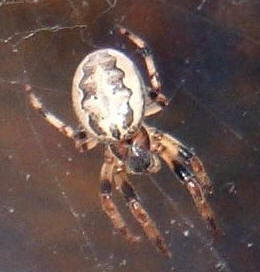 |
| “poca-salainn” ann an Asainte |
Nise, ceist eile a chuir mi air Iain ach cha robh fhios aige·san (Now, another question I put on Iain but
he didn’t know). Thuirt e nach do
bhruidhinn e mun cuairt air a leithid bhon a bha e na bhalach! (He said
that he hadn’t spoken about the like of it [in Gaelic] since he was a boy!). Dé theireamh sibhse san dùthaich seo ri spider?
he didn’t know). Thuirt e nach do
bhruidhinn e mun cuairt air a leithid bhon a bha e na bhalach! (He said
that he hadn’t spoken about the like of it [in Gaelic] since he was a boy!). Dé theireamh sibhse san dùthaich seo ri spider?
Ó, after a moment’s thought,
chanainn “poca-salainn”, ach chan eil mi glé chinnteach (Oh, I’d say poca-salainn [salt-bag], but I’m not
quite certain). That’s the very boy though, the very boy!
chanainn “poca-salainn”, ach chan eil mi glé chinnteach (Oh, I’d say poca-salainn [salt-bag], but I’m not
quite certain). That’s the very boy though, the very boy!
Feumaidh gum bitheamh e car coltach ri sin (It must be that it
would be fairly similar to that), bhon
sin a th’ aca an Sgìreachd Ròis co-thiù (for that is what they had in
Ross-shire anyway)… bhon a tha a thòin
car geal (because his bum is somewhat white ie salty-looking).
would be fairly similar to that), bhon
sin a th’ aca an Sgìreachd Ròis co-thiù (for that is what they had in
Ross-shire anyway)… bhon a tha a thòin
car geal (because his bum is somewhat white ie salty-looking).
Och seadh (oh yes). Gu
dearbh feumaidh (indeed it must), sin
a bhiodh an ùis co-dhiù (that’s what would be in use anyway). It seems just
discussing it a little further has affirmed Iain’s conception of whether the
word is right or not. Sometimes it’s dicy to speak further on it, in case an
erroneous response is set in stone, but in this case Iain’s word was
spontaneous without prompting and can be taken as representative of Assynt. A
check with the SID entry and we get pocan-salainn,
a diminutive version, and interestingly lacking pre-aspiration. Och, tha móran ann (oh there are lots)
says Iain continuing on:
dearbh feumaidh (indeed it must), sin
a bhiodh an ùis co-dhiù (that’s what would be in use anyway). It seems just
discussing it a little further has affirmed Iain’s conception of whether the
word is right or not. Sometimes it’s dicy to speak further on it, in case an
erroneous response is set in stone, but in this case Iain’s word was
spontaneous without prompting and can be taken as representative of Assynt. A
check with the SID entry and we get pocan-salainn,
a diminutive version, and interestingly lacking pre-aspiration. Och, tha móran ann (oh there are lots)
says Iain continuing on:
Na h-eòin bheag’ an sin; stonechat a chanas iad sa Bheurla. Nach e
“clachair” a bh’ ac orr? (The little birds there, “stonechat”
they say in English, isn’t it clachair
they have on them?) If only I had a couple of days up here to get into all of
this…
“clachair” a bh’ ac orr? (The little birds there, “stonechat”
they say in English, isn’t it clachair
they have on them?) If only I had a couple of days up here to get into all of
this…
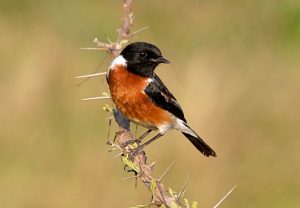 |
| “clachair” |
Och sna lathan air dol seachad, bha ainm ac air a h-uile dithean ‘s a
h-uile beothach (oh in the days gone by, they had a name on every flower
and animal) I reminisce, as if I had been there. That makes Iain think of
something amusing.
h-uile beothach (oh in the days gone by, they had a name on every flower
and animal) I reminisce, as if I had been there. That makes Iain think of
something amusing.
Rud a bha mi smaoineachadh air (a thing I was thinking on) he says,
dé a’ Ghàilig a th’ ac air umbrella? (What’s their Gaelic for
an umbrella?).
dé a’ Ghàilig a th’ ac air umbrella? (What’s their Gaelic for
an umbrella?).
Sgàilean, cha chreib
mi (Shade, I
reckon), quoting the standard tongue. Iain nods, but is clearly in thought. The
word doesn’t seem too familiar to him.
mi (Shade, I
reckon), quoting the standard tongue. Iain nods, but is clearly in thought. The
word doesn’t seem too familiar to him.
Tha beagan diofar
eadar a’ Ghàilig ann an Leódhas agas Uibhist (there’s a bit of a difference between the
Gaelic in Lewis and Uist) says Iain, gesticulating towards the sea as if to
bring back to mind that there are islands out there to the west.
eadar a’ Ghàilig ann an Leódhas agas Uibhist (there’s a bit of a difference between the
Gaelic in Lewis and Uist) says Iain, gesticulating towards the sea as if to
bring back to mind that there are islands out there to the west.
Ó tha, I agree, theirinn gu bheil a’ Ghàilig an seo (I’d say the Gaelic here), gu bheil i nas coltaiche ri Gàilig
Leódhais na tha i ri na h-Eileanan eile ge-ta (that it’s a little more
similar to Lewis Gaelic than it is to the other Isles). I’m keen to find out if
Iain a Dhà thinks so too.
Leódhais na tha i ri na h-Eileanan eile ge-ta (that it’s a little more
similar to Lewis Gaelic than it is to the other Isles). I’m keen to find out if
Iain a Dhà thinks so too.
Ó tha gu dearbh, ó tha (oh yes indeed, oh it is), he replies.
Tha i nas fhaisg air a’ Ghàilig a th’
ac an sin (It is closer to the Gaelic they have there). Ach na bha aid a’ bridhinn an seo, ‘s e
seòrsa Gàilig eile bha sin (But what they were speaking here, it was a
different kind of Gaelic). It’s lovely to hear that self-awareness, that
distinctness acknowledged by someone who is still a source of it himself.
Iain’s kind are on the way out on the mainland, and very, very few people seem
to consider it loss enough to get off their backsides and put on the brakes.
Native Gaelic in the Scottish mainland will be dead in 30 years. TOPS. Are we
ready to admit that to ourselves?
Tha i nas fhaisg air a’ Ghàilig a th’
ac an sin (It is closer to the Gaelic they have there). Ach na bha aid a’ bridhinn an seo, ‘s e
seòrsa Gàilig eile bha sin (But what they were speaking here, it was a
different kind of Gaelic). It’s lovely to hear that self-awareness, that
distinctness acknowledged by someone who is still a source of it himself.
Iain’s kind are on the way out on the mainland, and very, very few people seem
to consider it loss enough to get off their backsides and put on the brakes.
Native Gaelic in the Scottish mainland will be dead in 30 years. TOPS. Are we
ready to admit that to ourselves?
Nise, dé bha sibhse ‘g
ràdh ann an seo
(Now, what were you saying here) air
–mar a their ead anns a’ Bheurla- how are
you? (on –as they say in English- “how are you?”) Dé a bh’ agaibh·se air sin? (What did you have on that?). I’m
always curious about this one. We once produced a map here at DROITSEACH
showing where the different phrases were used and I’m keen to settle a debate
raised by someone who was sure that cionnas
a tha u? was used all the way from Gairloch north.
ràdh ann an seo
(Now, what were you saying here) air
–mar a their ead anns a’ Bheurla- how are
you? (on –as they say in English- “how are you?”) Dé a bh’ agaibh·se air sin? (What did you have on that?). I’m
always curious about this one. We once produced a map here at DROITSEACH
showing where the different phrases were used and I’m keen to settle a debate
raised by someone who was sure that cionnas
a tha u? was used all the way from Gairloch north.
Ó, “ciamar a tha u?” Iain says without hesitation.
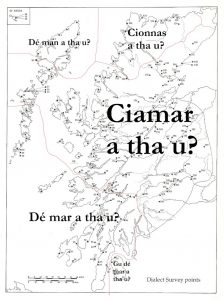 |
| “ciamar a tha u?” |
“ciamar a tha u?”? I repeat, slightly surprised. Bhon, daoine shuas taobh Dhùthaich
MhicAoidh, their ead “cionnas a tha u?” (Because, people up MacKay Country
way, they say cionnas a tha u?) Ach ‘s e “ciamar” a bh’ agaibh ann an seo?
(But it’s ciamar that you had here?)
MhicAoidh, their ead “cionnas a tha u?” (Because, people up MacKay Country
way, they say cionnas a tha u?) Ach ‘s e “ciamar” a bh’ agaibh ann an seo?
(But it’s ciamar that you had here?)
Ó ‘s e (oh it was).
Agas ‘s e “ciamar” a
bh’ aig ur pàrantan cuideachd? (And it’s ciamar that your
parents had too?)
bh’ aig ur pàrantan cuideachd? (And it’s ciamar that your
parents had too?)
Ó gu dearbh, ‘s e (oh indeed, yes). That’s that one
beyond any doubt.
beyond any doubt.
Tha sibh ga mo
thuigsinn a-nis, nach eil? (you’re understanding me now, aren’t you?). I often try to speak the
dialect of the older generation if I’m with them to make sure I come over ok,
but in this case I wasn’t too sure what the dialect of Assynt was like. Unlike
the MacKay Country where I can converse quite freely in the local patois, here
I thought while I’d better round out some obvious Dalriadisms, I may well just
confuse matters by starting to make guesses about what might be more
comprehensible. Sure, they’ll say can
instead of abair (say) and obvious
northern things like that, but I didn’t want to go out on too weak a branch on
a first visit.
thuigsinn a-nis, nach eil? (you’re understanding me now, aren’t you?). I often try to speak the
dialect of the older generation if I’m with them to make sure I come over ok,
but in this case I wasn’t too sure what the dialect of Assynt was like. Unlike
the MacKay Country where I can converse quite freely in the local patois, here
I thought while I’d better round out some obvious Dalriadisms, I may well just
confuse matters by starting to make guesses about what might be more
comprehensible. Sure, they’ll say can
instead of abair (say) and obvious
northern things like that, but I didn’t want to go out on too weak a branch on
a first visit.
Och tha, tha glé
cheart a-nis (oh
yes, just fine now). I’m off the hook!
cheart a-nis (oh
yes, just fine now). I’m off the hook!
Ach co-thiù, cha robh
mi ach dol seachad
(But anyway, I was but going past), tha
mi dol sìos thun an Dòrnaidh a-nochd (I’m going down to the Dornie
tonight).
mi ach dol seachad
(But anyway, I was but going past), tha
mi dol sìos thun an Dòrnaidh a-nochd (I’m going down to the Dornie
tonight).
Ó, an Dòrnaidh, tha mi
tuigsinn (oh the
Dornie, I understand).
tuigsinn (oh the
Dornie, I understand).
Thuirt mi ri Iain, an
ath uair a bhitheas mi ‘dol seachad (I said to Iain, the next time I’m going past), thig sinn uile comhla ‘s bruidhnidh sinn beagan Gàilig (we’ll all
come together and speak a little Gaelic).
ath uair a bhitheas mi ‘dol seachad (I said to Iain, the next time I’m going past), thig sinn uile comhla ‘s bruidhnidh sinn beagan Gàilig (we’ll all
come together and speak a little Gaelic).
Ó seadh, glé mhath, nì
sinn sin ma-thà (Oh
yes, very good, we’ll do that then). There’s no sense of imposition about this
idea in Iain’s voice whatsoever, I can tell he’d be more than happy to sit with
a cup of tea or a dram and blether in the old tongue. Uair sam bith a tha u ‘dol seachad, trobhad a-staigh (anytime you’re
going past, come on in). And once again. There it is!
sinn sin ma-thà (Oh
yes, very good, we’ll do that then). There’s no sense of imposition about this
idea in Iain’s voice whatsoever, I can tell he’d be more than happy to sit with
a cup of tea or a dram and blether in the old tongue. Uair sam bith a tha u ‘dol seachad, trobhad a-staigh (anytime you’re
going past, come on in). And once again. There it is!
Bithidh sin gasta
ma-tà (that’ll be
splendid then). I smile as we back away from the house, still chatting.
ma-tà (that’ll be
splendid then). I smile as we back away from the house, still chatting.
Tha fliuch! (It’s wet!) adds Iain, as we stand
at the gate getting lightly spat on.
at the gate getting lightly spat on.
Tha, bha fliuch fad an t-Samhraimh (Yes, it was
wet throughout the summer). Bha dona
([It] was bad).
wet throughout the summer). Bha dona
([It] was bad).
Ó gu dearbh, bha móran
uisg ann (oh
indeed, there was a lot of water ie rain). Bha
sneachd ann cuideachd.
(There was snow too). Cha do thiormaich am mòin a bh’ agam son an tein gu ceart (The peat I had for the fire didn’t
dry out properly). Uisg uisg uisg!
(Rain rain rain!).
uisg ann (oh
indeed, there was a lot of water ie rain). Bha
sneachd ann cuideachd.
(There was snow too). Cha do thiormaich am mòin a bh’ agam son an tein gu ceart (The peat I had for the fire didn’t
dry out properly). Uisg uisg uisg!
(Rain rain rain!).
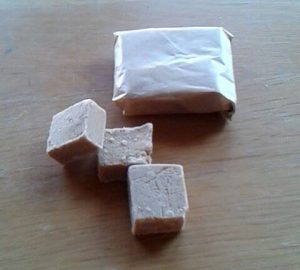 |
| clàr-siùcair air son nan Gàidheal |
Och seamh (oh aye), ‘s e dìle-bhàit’ a bh’ ann o cheann gu ceann na mìos, an July mar a
their ead (there was a drowning flood from head to head of the month, in
July, as they say). It is not common for dialect speakers to know the months of
the Julian calendar, as it was not used until relatively recently. Nise, rud a th’ agam an seo (now, the
thing I have here), reinn mo bhean
beagan clàr-siùcair son na h-uile duin’ a chì mi shuas an seo (my wife made
a little tablet for everyone I see up here).
their ead (there was a drowning flood from head to head of the month, in
July, as they say). It is not common for dialect speakers to know the months of
the Julian calendar, as it was not used until relatively recently. Nise, rud a th’ agam an seo (now, the
thing I have here), reinn mo bhean
beagan clàr-siùcair son na h-uile duin’ a chì mi shuas an seo (my wife made
a little tablet for everyone I see up here).
Dé a th’ ann? (What is it?)
Tablet.
Ó glé mhath (oh very good).
Tha uamharraidh milis (It’s awfully sweet).
Móran siùcair ann! (Much sugar in it!)
Dìreach (Exactly). Nise, tha mi dol a thogail dealbh bheag dhinn an seo leis an taigh
(Now I’m going to lift a small picture of us here with the house). Bheil sin ceart gu leòr? (Is that
alright?)
(Now I’m going to lift a small picture of us here with the house). Bheil sin ceart gu leòr? (Is that
alright?)
Och tha (oh yes).
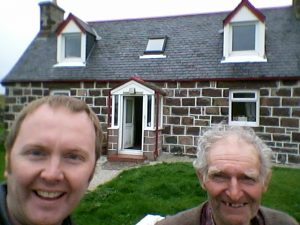 |
| Àdhamh Ó Broin agas Iain MacIllEathain ann an Asainte |
Innsidh do mo chlann
gun do thachair mi air Gáidheal, Iain MacIllEathain (I’ll tell my children that I met a Gael, Iain
MacLean), shuas taobh Asainte (up
Assynt way). The kids always like to hear that there are other people in other
places who speak their language.
gun do thachair mi air Gáidheal, Iain MacIllEathain (I’ll tell my children that I met a Gael, Iain
MacLean), shuas taobh Asainte (up
Assynt way). The kids always like to hear that there are other people in other
places who speak their language.
Ha-ha, sin agad e! (there you have it!).
And with that, I took my leave, feeling
genuinely buoyed up by this encounter, but more sure than ever of what needed
done. Seven months later and that feeling has only grown. Both Iains, despite
the protestations of Iain #1 to the contrary, were very fluent. Coupled with
the vocabulary contained in the Survey of Irish Dialects, this means that the
local dialect is absolutely capable of being rescued in the nick of time. All
we lack is the will. Or do we? Is there actually someone out there with
connections to the place, who has learned enough Gaelic to take the work on,
who could become a TOSGAIR for the area and spend a few hours a week learning
to speak like the two Iains? Could their tale and that of their language be
prevented from its end when inevitably sometime over the next 20-odd years,
they are parted from this world? This may seem like a very personal way to
speak about two people I barely know, but what choice do I have but to take on this
responsibility when very few others will? Don’t tell me that local lore,
vocabulary and accent are important and then do bugger-all about it. It’s
either worth something, or it’s not. There is no in between.
genuinely buoyed up by this encounter, but more sure than ever of what needed
done. Seven months later and that feeling has only grown. Both Iains, despite
the protestations of Iain #1 to the contrary, were very fluent. Coupled with
the vocabulary contained in the Survey of Irish Dialects, this means that the
local dialect is absolutely capable of being rescued in the nick of time. All
we lack is the will. Or do we? Is there actually someone out there with
connections to the place, who has learned enough Gaelic to take the work on,
who could become a TOSGAIR for the area and spend a few hours a week learning
to speak like the two Iains? Could their tale and that of their language be
prevented from its end when inevitably sometime over the next 20-odd years,
they are parted from this world? This may seem like a very personal way to
speak about two people I barely know, but what choice do I have but to take on this
responsibility when very few others will? Don’t tell me that local lore,
vocabulary and accent are important and then do bugger-all about it. It’s
either worth something, or it’s not. There is no in between.
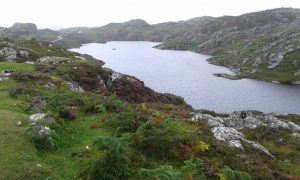 |
| Asaint nan Loch ‘s nan Creig |
And so I left Assynt feeling that while I had
spent barely three hours there, I had got under the turf, down to the peat of
it a little. The Land of MacLeod lived yet as it was, but was barely hanging on
by the skin of its teeth. I had dug under the myth of Neil the Traitor and I
had heard the tongue of his people, who for better or for worse had stuck it
out in Assynt ever since, through Clearance, poverty and war. The whole
experience had been very moving.
spent barely three hours there, I had got under the turf, down to the peat of
it a little. The Land of MacLeod lived yet as it was, but was barely hanging on
by the skin of its teeth. I had dug under the myth of Neil the Traitor and I
had heard the tongue of his people, who for better or for worse had stuck it
out in Assynt ever since, through Clearance, poverty and war. The whole
experience had been very moving.
Dair a bhitheas mi ‘n
Asaint (When I am
in Assynt), as Rob Donn MacAoidh (MacKay)
put it, Is Leòdach mi (I am a MacLeod).
Whatever area I enter, I become one of the people. I never feel like I am an
outsider because I value deeply all that every nook and crannie of the Scottish
Highlands has to offer and I can’t help but take the demise of its culture as a
personal injury. My journey took me back across to Lochinver and I was struck
by how rugged the land was, pocketed with wildly uneven lochs and hollows, puntuated
vertically by jagged rock and bluff, green and grey and ginger with dying
bracken under a film of kissing rain. This land is the physical expression of
the language that our Iains speak and when these men cease to speak, the land
will fall silent forever, another corner of the Highlands will go dark, its
cultural life’s blood will cease to pump through local veins, will reach no
more these extremities, withdrawing out to the Isles where it will meet a
similar fate in little over 50 years, if we are not very, very, careful
and more importantly, indefatigable in our determination to resist.Monographs, dictionaries, manuals -however good- are but a single cornerstone, not a whole house.
Asaint (When I am
in Assynt), as Rob Donn MacAoidh (MacKay)
put it, Is Leòdach mi (I am a MacLeod).
Whatever area I enter, I become one of the people. I never feel like I am an
outsider because I value deeply all that every nook and crannie of the Scottish
Highlands has to offer and I can’t help but take the demise of its culture as a
personal injury. My journey took me back across to Lochinver and I was struck
by how rugged the land was, pocketed with wildly uneven lochs and hollows, puntuated
vertically by jagged rock and bluff, green and grey and ginger with dying
bracken under a film of kissing rain. This land is the physical expression of
the language that our Iains speak and when these men cease to speak, the land
will fall silent forever, another corner of the Highlands will go dark, its
cultural life’s blood will cease to pump through local veins, will reach no
more these extremities, withdrawing out to the Isles where it will meet a
similar fate in little over 50 years, if we are not very, very, careful
and more importantly, indefatigable in our determination to resist.Monographs, dictionaries, manuals -however good- are but a single cornerstone, not a whole house.
Scholars, academics, researchers -however smart- must be as slaves to the wisdom of our elders.
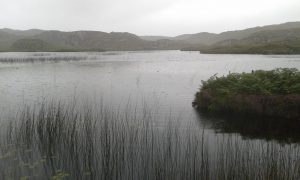 |
| Dair a bhitheas mi ‘n Asaint, is Leòdach mi |
To putting the horse back before the cart, in the land of MacLeod and beyond, ur slàinte mhór!–
“Beautiful gripping writing.
Should be a book, not just a blog”
Alastair McIntosh
“Beautiful gripping writing.
Should be a book, not just a blog”
Alastair McIntosh
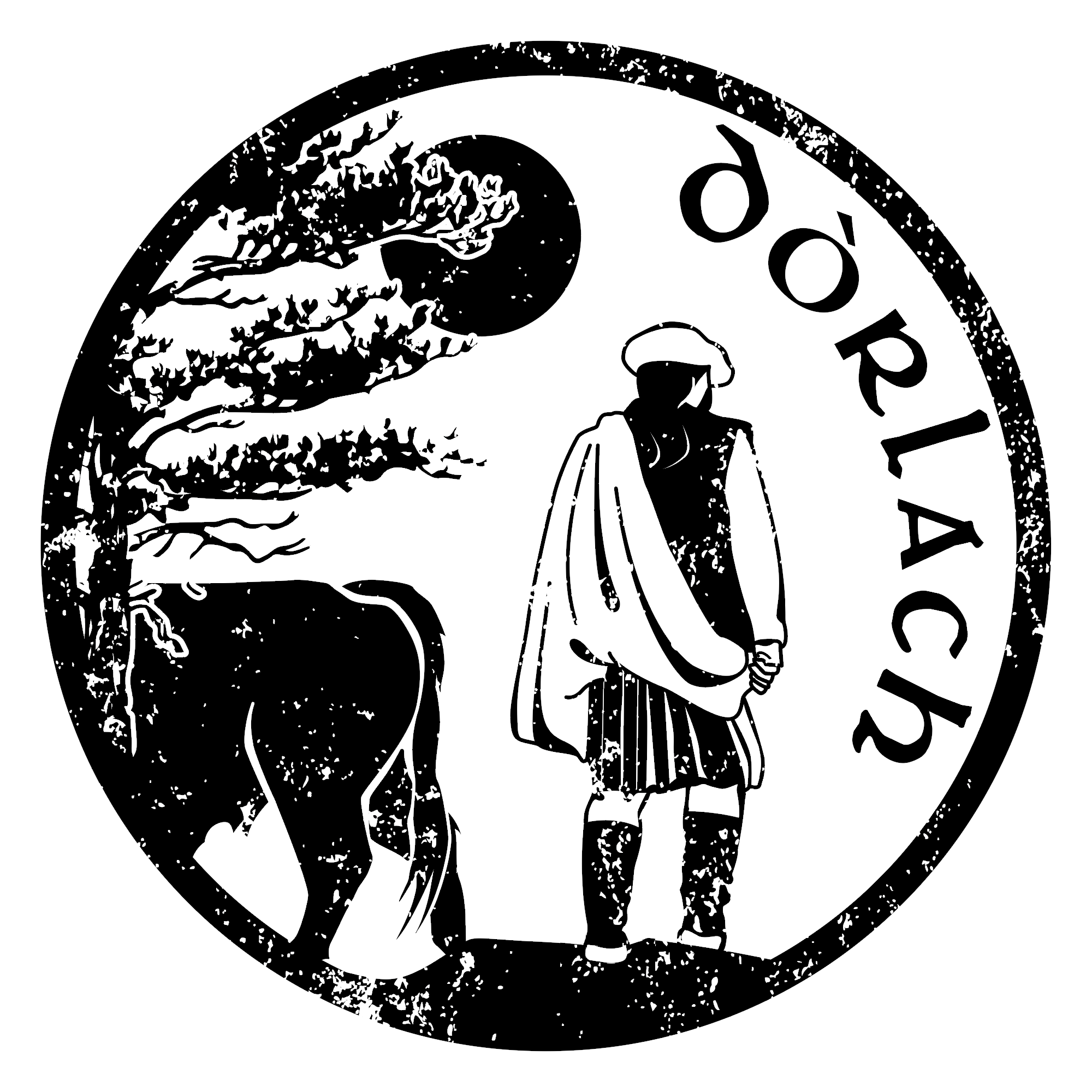
Tha seo air leth math Adhaimh, agus tha mi dol leis a h-uile rud a tha thu 'g ràdh mun "ath-bheòthachadh" vibrant & thriving (leugh marbhanta is breòite) a th'againn. Ag obair an Cataibh, is Asainte na chois, cha do thachair mi ri Iain the Gate fhathast ged a bhruidhinn mi ris air a' fòn oir bha laogh aige bha meadhanach. An ath thuras, cumaidh mi Gàidhlig ris.
Thank you so much for this. Much of my next book is set in Assynt. Your insights into the dialect are great.
Dall ort. Tha a' Ghàidhlig aige glé mhath, gead nach aidich e sin! Iarr air innseamh dhuit fam faigh u Iain Rorag. Gheobh u comhradh coimheach math bhuaidh'….
'S e do bheatha gu dearbh 🙂
Còrd rium gu dearbh a 'bhalaich ….cùm a ' dol .
Gu robh math agaibh!